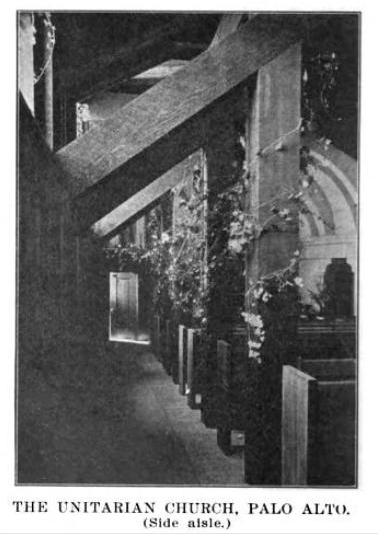Here are documents that tell the story of the early years of the old Unitarian Church of Palo Alto.
The Women’s Alliance (1906)
PALO ALTO.
Branch Alliance of the Unitarian Church, 25 members.
Pres., Mrs. Agnes B. Kitchen, 912 Cowper St., Palo Alto.
Vice-Pres., Mrs. Isabel Butler, 853 Middlefield Rd., Palo Alto.
Sec., Mrs. Isabelle Wocker, 853 Middlefield Rd., Palo Alto.
Treas., Mrs. Emily S. Karns, P. O. Box 148, Palo Alto.
Ch. Cheerful Letter, Mrs. Jessie B. Palmer, 765 Channing Ave., Palo Alto.
Includes all the women’s organizations of the church.
Committees: Hospitality, House, Decoration, Entertainment, Work.
Meetings second and fourth Tuesdays at 2 P.M.
Money raised, $205.15. Disbursed: $8.35 to National Alliance; $150 for church lot; $6 for hymn books; $25.98 for materials. Organized October 21, 1905.
— Manual, 1906, National Alliance of Unitarian and Other Liberal Christian Woman (New York, Knickerbocker Press, 1906), p. 168.
The New Church Building (1907)
The most important event in the department of church extension during the past month was the dedication of the new church-building at Palo Alto. This occurred on Sunday morning, March 24th. It was a home affair, simple, but very interesting to the faithful Unitarians who have worked so hard and sacrificed so much to bring the enterprise to a successful termination. The erection of this church was made possible by the generosity of Mrs. Frances A. Hackley, of Tarrytown, N. Y., who has done so much for the Unitarian cause in this department. The members of the church entered into the work with a determination to make the new church-building not only useful but beautiful and convenient. The interior of the new church is all that could be desired; the exterior will not show its merit until the vines grow over it, as the vines are an essential part of the plan. The services in dedication were well attended.
— The Pacific Unitarian, vol. 15, no. 6, April, 1907 (San Francisco: Pacific Unitarian Conference), p. 165.

Above: The old Unitarian church, designed by Bernard Maybeck (from The Pacific Unitarian, May, 1907, p. 206)
Continue reading “The Unitarian Church of Palo Alto, 1905-1909”
